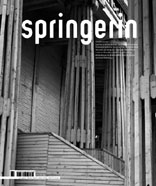Issue 3/2004
World Provinces
Contemporary art derives much of its sanction from its »difference from the provincial«. Liberal-minded, cosmopolitan impetus here – backward, insular provincialism there. As a rhetorical move, at least, this still seems to function well; recently, in connection with contexts of globalization, there was even talk of »art from the world provinces«. But who decides which artistic origins and sets of references are to be considered provincial, and which cosmopolitan and chic? Where exactly does the border lie between urban-central and rural-peripheral? Which cultural factors nurture the still dominant »city-country« power divide today? The authors featured in this issue address these questions from various perspectives. At first, centre stage is once more taken by the new-old geography of power, which, although it has undergone a fundament... » read more

Net section
The Terror of Intellectual Property
The Case against the Critical Art Ensemble
Felix Stalder
An International City in the Shadows
A round trip through Belgrade
Vera Tollmann & Micz Flor
Between GPS and Telegraph Poles
Two projects at this year’s ISEA symposium
Luisa Ziaja
Filter, Link, Blog
The 25th Ars Electronica chose an appropriate theme: »Timeshift – The World in Twenty-Five Years«
Christian Höller
Infection as Communication
The project »I love you [rev.eng]« and its treatment of computer viruses
Alessandro Ludovico
From Visual Presence to Utopia
Some thoughts on the status quo and future of the booming visual scene
Petra Erdmann
Lost & Found (V)
This September in Kassel the possibility of reviving the first Punk movement was put to the test.
Christian Höller
World Provinces
Drifting Through the Grid:
Psychogeography and Imperial Infrastructure
Brian Holmes
The Insecurity of the Edge
The topography of centre and periphery
Klaus Ronneberger
The Provinces are Alive!
Observations on the non-urban space in literature and art
Magdalena Taube
Wild Sheep Hunt on the Aegean and the Transnational »Mujahideen« of Rastanski Lojia
Border regimes on the south-eastern border of Europe
Serhat Karakayali & Vassilis Tsianos
Post-Soviet Counter-Routine
The small arts scene in the Kyrgyzstan capital of Bishkek is testing the waters of emancipation. But the modern legacy of the Soviet Empire is not the only obstacle on the road leading away from the still-prevailing academicism.
Georg Schöllhammer
New Self-Images, Old Differences
»DAK’ART 2004 – 6 ème Biennale de l’Art Africain Contemporain«
Christian Kravagna
Reality without Guarantee
Christine Meisner’s »work in progress« on European opinions and African realities
Dietrich Heißenbüttel
From Lüderitz Bay to the Hindu Kush
The debate on German colonialism
Jochen Becker
One Present, Two Systems
International and local perceptions of Chinese contemporary art
Xenia Tetmajer von Przerwa
Countering the vertical power structure
On the state of contemporary art in the Russian provinces
Herwig G. Höller
Proposal for a New Kunsthaus, not further developed
Print Version only
Josef Dabernig
Peeling Hot Potatoes. Radicalizations of Everyday Disturbances
Thoughts on Viktor Rogy (1924-2004)
Nicola Hirner
the last visit
farewell from viktor rogy
Friedrich Achleitner
Artscribe
»Schrumpfende Städte«
Benjamin Paul
Josef Kramhöller
Heike Ander
6. Internationale Foto-Triennale Esslingen:
Hina Berau
»Videodreams:
Monika Vykoukal
6. Werkleitz Biennale:
Simon Sheikh
»A Minimal Future? Art as Object 1958-1968«
Martin Beck
Yto Barrada :
Gregor Jansen
Manifesta 5
Marina Grzinic
XXVI. Biennale
Hedwig Saxenhuber
Olafur Eliasson:
Susanne Neuburger
Stefan Constantinescu:
Susanne Neuburger
»The Future Has a Silver Lining:
Annina Zimmermann
»Born to be a star«
Nicola Hirner
Books
Frank Hartmann:
Mediologie
Tania Hölzl & Michael Manfé
M. Jeffrey Hardwick:
Mall Maker
Anette Baldauf
Gerald Raunig (Hg.):
Bildräume und Raumbilder
Jens Kastner
Yvonne P. Doderer:
Urbane Praktiken
Klaus Ronneberger
Norbert Pfaffenbichler, Sandro Droschl (Hg.):
Abstraction Now
Dietmar Schwärzler
Stefan Bidner, Thomas Feuerstein (Hg.):
Sample Minds
Dietmar Schwärzler